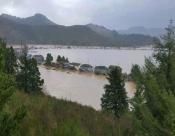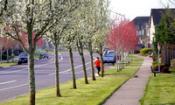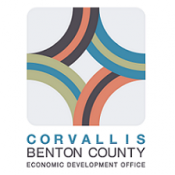Development Services Newsletter | January 2025

Upcoming Changes to the City’s Floodplain – Biological Opinion Update
Many cities and counties throughout Oregon are in the process of making changes to our floodplain regulations to align with the requirements from FEMA pertaining to a Biological Opinion issued by the National Marine Fisheries Service. This will impact areas in and around the City’s floodplain areas. FEMA is requiring communities to choose and adopt interim measures, called Pre-Implementation Compliance Measures (PICMs). The City has selected the option to require permit applicants to develop a Floodplain Habitat Assessment documenting that their proposed development in the Special Flood Hazard Area will achieve “no net loss.” A brief summary of the options and PICM process is available here. We are in the process of reviewing and updating Corvallis Land Development Code to incorporate this requirement into the floodplain development process.

Development Services Goes Paperless!
To provide a more sustainable plan review process, Development Services has transitioned to paperless permitting! Incoming applications, plans, and other documents can be uploaded through our online portal at www.corvallispermits.com. The system is free and allows citizens to apply for permits, schedule inspections, pay fees, and upload and/or download plans their convenience. Electronic permitting streamlines the plan review process and allows convenient access to important information 24 hours a day. Help us go paperless by submitting your permit application online today!
Mechanical Minor Labels
The Development Services Division participates in the plumbing and electrical Minor Label Program administered by the State Building Codes Division (BCD). Recently, mechanical minor labels were added to this program, and licensed contractors can now participate in the mechanical minor label program.
Minor labels are inexpensive permits for use by licensed contractors in the state of Oregon. Labels are purchased directly from the BCD in lots of 10 and are valid for one year from the date of purchase. Minor labels can be used for certain minor repairs and installations, such as replacing a water heater or installing a new mini-split heat pump in a single-family dwelling. The City is required to randomly inspect 10% of the labels, as directed by the BCD. It is important for contractors participating in the minor label program to ensure local regulations for floodplain, mechanical screening, etc. are being met, as they are still required even for projects permitted through the BCD’s minor label program.
For more information on the types of work that can be completed under the minor label program, or to purchase minor labels, go to https://www.oregon.gov/bcd/minlab/Pages/minor-label-info.aspx.

Project Highlight – OSU Huang Collaborative Innovation Complex
Development Services has had the pleasure of working with Oregon State University on the new Huang Collaborative Innovation Complex (CIC). Permits for the new high-tech complex were issued in April, and construction has been steadily increasing since. You can see live footage of the construction and its progress at https://webcam.oregonstate.edu/HCIC2.
The Huang CIC will house one of the nation’s most powerful supercomputers and will be used as a research and teaching center. The complex will include a state-of-the-art cleanroom, multiple laboratories, and an extended reality theatre, all of which will provide students and faculty with the technology to solve critical challenges facing the world.
Go to https://leadership.oregonstate.edu/huang-cic for more information about what’s planned for the complex, its donors, and more.

Changes to Lot Development Option / Development Code Variations – Effective January 1, 2025
The City Council recently adopted Land Development Code (LDC) text amendments associated with both Corvallis and State of Oregon initiatives related to how certain development standards may be varied as part of individual development project applications. Standards that may apply to development projects are contained in the Land Development Code in the individual Zones in Article III (example: RS-6 Low Density Residential Zone) and in generalized topic areas in Article IV (examples: public improvements, parking, landscaping, pedestrian design, etc.)
Consistent with the “alternative approval process” allowances in State law (ORS 197A.400), the LDC provides procedures and approval criteria that allow variations to certain development standards. At the highest level, the procedures are contained either in the Planned Development or Lot Development Option (LDO) chapters in Article II of the Code.
The recently-adopted code amendments focus on the Lot Development Option process and approval criteria. The LDO process has been in place since the original, 1980 version of the Land Development Code. While the LDO code provisions have been amended several times since the 1980s, the overall structure and general allowances for what standards may be varied have largely remained unchanged. More recently, the City adopted project P-13V as part of the Strategic Operational Plan (SOP). The objective for project P-13V is to evaluate the LDO chapter, consider policy amendments, and help clarify the procedures and approval criteria.
Additionally, as part of its 2024 Regular Session, the Oregon Legislature passed Senate Bill 1537 (SB 1537). The new law contains several elements, all with a focus on strategies to increase housing affordability and availability. One of the requirements of SB 1537 is that local governments must grant requests for variations or adjustments to certain development standards, for housing projects that meet criteria established in the new law (“Housing Land Use Adjustments” or “HLUA”).
The new code amendments, primarily contained within LDC Chapter 2.12, establish new Development Standards Adjustment (DSA) provisions that replace the Lot Development Option (LDO) provisions. The amendments also implement Oregon’s HLUA requirements. The new provisions include both Minor and Major DSA processes that generally mirror the Minor and Major LDO processes. Proposed variations that qualify under the HLUA provisions will follow a process that is very similar to the current Minor LDO process. Development Standards Adjustment code amendments are effective on January 1, 2025, and will be published online by that time. More information can be found in City Council ordinance 2024-26, found on this page - https://www.corvallisoregon.gov/cd/page/land-development-code.

Downtown Corvallis Revolving Loan Program
The Downtown Corvallis Revolving Loan Program applications were opened in May 2024 and were awarded to three business in the downtown area. Eligible projects include a variety of business investments, including building rehabilitation, painting, window repair, interior design, electrical and plumbing upgrades, and sustainability improvements up to 50% of total project costs. Details of each loan and a summary of work for each can be found below.
Greenhouse Coffee + Plants at 308 SW Monroe Ave was awarded a low-rate loan of $15,000 to accomplish interior and exterior renovations to the 1920s building where they operate. Greenhouse was able to expand into the space next door and increase their retail square footage to showcase more plants and increase seating capacity. On the exterior, they added an awning and illuminated exterior sign. Greenhouse offers a variety of non-dairy drink options and a wide array of interior plants and complementary goods. Check out their drink menu at www.greenhousecorvallis.com.
Munster & Company at 212 SW 3rd St was awarded a low-rate loan of almost $5,000 to help restore the original fir flooring in their retail space and build and install custom bookcases. In business since 2017, this is their first foray into a brick-and-mortar location and hope to open to the public in early 2025. A family-owned provider of rare, collectible, out of print, and scholarly books, they currently list 6,500 online and house 1,800 boxes of books and ephemera. Find them at www.munsterbooks.com.
Cut4Cut at 128 SW 3rd St was awarded a low-rate loan of $13,500 to retrofit a space into a barbershop. Flooring, lighting, painting, mirrors and countertops in addition to HVAC concerns comprised most of the interior renovations. On the exterior, painting, signs and façade improvements along with a traditional barber pole pay homage to the barbershop’s roots while drawing attention to the shop. A men’s barbershop, chairs will be rented by the owner and haircuts are available to book with the owner at instagram.com/cut4cut.llc.

Climate Friendly Parking Design
There have been several changes required by the State of Oregon over the past few years to promote Climate Friendly and Equitable Communities. Some of these changes have included the elimination of required minimum vehicle parking spaces, requiring EV conduit be installed for 40% of vehicle parking spaces being constructed, and new climate friendly parking lot design requirements.
New projects that are proposing to add a new surface parking area that exceeds ½ acre must provide one of the following:
- Installation of solar panels with a generation capacity of at least 0.5 kilowatt for each new provided parking space on the Development Site. Solar panels may be located anywhere on the Development Site.
- Payment in an amount of $1,500 for each new provided parking space on the Development Site. Payments received will then be transmitted by the City into a fund managed by the Oregon Department of Energy dedicated to equitable solar and wind energy development.
- Provide parking lot trees such that the total parking lot tree canopy covers at least 40% of new Surface Parking Area (excluding non-paved surfaces such as landscape or tree islands).
For more information on Oregon’s Climate Friendly and Equitable Communities Program, you can view the City’s Planning Division’s website at Oregon Climate-Friendly and Equitable Communities Program | Corvallis Oregon or the Oregon Department of Conservation and Development website at www.oregon.gov/lcd/CL/Pages/CFEC.aspx.
Community Development Resources
Looking for more information on the development review and/or permitting process? The Community Development Publications page on the city website includes links to many documents, such as the Land Development Code, Comprehensive Plan, and Municipal Code and Ordinances. Don’t hesitate to contact us if you have any questions.